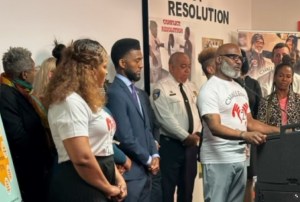By Roberto E. Alejandro
A lot of political energy in Maryland has been spent in recent years to establish or strengthen civilian review boards for local police departments. It is important to know, however, if your civil rights have been violated by the police in a way that actually caused you harm, a civilian review board cannot help you.
On July 1, 2022, a law will go into effect in Maryland establishing civilian review boards over police in every Maryland county. Referred to as “police accountability boards,” these boards will be empowered to receive police misconduct complaints against officers from Marylanders. While these accountability boards play a role in potentially (that is, maybe) recommending discipline against an officer accused of misconduct, these boards are in no way empowered to compensate the victim of police misconduct for the harm they have suffered. What is worse, because many Marylanders do not understand how civil rights protections operate in the state, many residents who have been harmed by police may end up making complaints to a department or review board that has no ability to help that injured resident.
First, it is important for Marylanders to know that, even without civilian review boards, there are already laws in place that allow residents to defend their own rights against police misconduct. For example, Maryland’s highest court, the Court of Appeals, has interpreted the Maryland Constitution as guaranteeing the right to sue an individual police officer or other government employee directly if that employee violates your state constitutional rights. This right has been recognized since at least 1909, as stated in a case captioned Weyler v. Gibson.
Additionally, the Maryland General Assembly has provided pathways for suing the state or a local government directly when an employee of either, like a police officer, has harmed you. Those pathways are the Maryland Tort Claims Act (“MTCA”) and the Local Government Tort Claims Act (“LGTCA”). In oversimplified summary, these two acts waive the immunity against suit that governments traditionally enjoy in the United States and allow Marylanders to sue the state or a local government directly for harm caused by government employees such as police officers.
If you have been falsely arrested by a state or local police officer, or subjected to excessive force, these acts allow you to sue the state or local government who employed that officer for the harm you suffered. Both acts, however, require that a notice be provided to the relevant government within one year of any harm suffered. If that notice is not provided within that one-year time frame, a person loses the ability to bring suit against the state or local government and receive compensation for their harm.
Providing notice under these two acts, however, is something of a technical legal endeavor. The notice has to be provided to specific entities empowered to investigate claims against the relevant government, and these entities never include a law enforcement agency or a police accountability board. If you are harmed by a police officer and file a misconduct complaint against them with a civilian review board or even the department itself, the law does not consider you to have given notice of your claim to the government. That means that if you complain of police misconduct to a law enforcement agency or civilian review board directly, you have not preserved your right to sue and be compensated for the harm you suffered. If, in addition to your misconduct complaint, you do not also provide the notice required by the MTCA or LGTCA within one-year of your injury, you will never be able to recover anything for your injuries.

The Maryland General Assembly could address this issue through future amendments to the new police accountability board statutes. The current law, soon to take effect, requires a police accountability board to forward any complaint against an officer to the local law enforcement agency who employs that officer for further investigation. The law could be amended to require the board to also notify the relevant governmental entity of a potential claim under the LGTCA or MTCA when a misconduct complaint is filed.
As the law on police accountability boards currently stands, however, a complaint to such a board will not satisfy the notice requirements of the MTCA or LGTCA. Unfortunately, much more public energy has been expended on advocating for increased civilian review rather than educating Marylanders about their civil rights protections under current law. As a result, many Marylanders think of filing a misconduct complaint with a review board or police agency as their first necessary step in seeking redress if they have been harmed by police. The reality, however, is that a misconduct complaint plays no role in a citizen receiving compensation for harm caused by the police. Anyone who has been harmed by police and makes a misconduct complaint is in serious risk of wasting time with a process that cannot redress their injuries. If someone wastes more than one year in this process, they will realize too late that they can now never be compensated for the harm they suffered.
The harm suffered by regular persons when their civil rights are violated by law enforcement are severe. Excessive force is not simply force beyond what is reasonably necessary in a given situation, excessive force is injury and life-long physical consequence for a fellow human being. Being falsely detained or arrested is not a temporary inconvenience, it imposes lasting and traumatic psychological consequences and often results in cascading economic consequences as well. These are not injuries that can be redressed with an adverse employment action like suspension or termination of an officer. Unfortunately, an adverse employment action is the highest form of recovery a complaint to a future police accountability board can yield for a victim in Maryland. If you were permanently injured by a police officer without cause, how would that officer being fired pay for your ongoing and future medical needs?
If you have been harmed by police in Maryland, consult an attorney so that you can serve proper notice under the MTCA or LGTCA to the relevant governmental entity and seek actual redress for your injury. When it comes to harmful police misconduct, a civilian review board cannot help you.
Roberto E. Alejandro is a civil rights lawyer in Annapolis, Maryland. In addition to three law licenses, Roberto holds a PhD in theology and religion and is an independent scholar with two published works on politics and religion, including The Crucifixion and Resurrection of Freddie Gray.
The opinions on this page are those of the writers and not necessarily those of the AFRO. Send letters to The Afro-American • 145 W. Ostend Street Ste 600, Office #536, Baltimore, MD 21230 or fax to 1-877-570-9297 or e-mail to editor@afro.com
Help us Continue to tell OUR Story and join the AFRO family as a member – subscribers are now members! Join here!
The post Commentary: If You Have Been Harmed by Police, Maryland’s New Accountability Boards Can’t Help You appeared first on AFRO American Newspapers .










